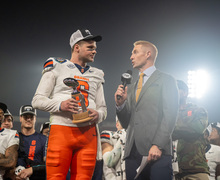Popular Dean campaign mobilizes student population at SU
Over 1,200 Iowa State University students recently packed into an auditorium to hear former Vermont Gov. Howard Dean speak at a political rally – unbelievable considering it was Dean’s third visit to the university.
Joel Taylor, former president of Iowa State’s Cyclones for Dean organization, is part of the college craze that has surrounded the Dean campaign. In fact, despite Dean’s lack of success in the Iowa caucus and New Hampshire primaries, Dean’s college movement continues to grow larger than ever. More importantly, many of Dean’s supporters believe that even if he fails to grab the Democratic presidential nomination, he may have started a new trend of mobilizing college-aged voters.
‘I’ve been campaigning for (Dean) for a while,’ Taylor said. ‘I don’t know the reason why but the student involvement has increased for this caucus and there’s a lot of support here for Dean.’
At most universities around the country, the Dean movement goes by the name of ‘Generation Dean.’ This college activism is part of the larger Dean movement, ‘Dean for America.’ According to the Generation Dean website, the movement first began in January 2003, when groups popped up independently at the University of Texas and George Washington University. Soon after, street teams of college students began spreading the word in Washington, D.C. whenever Dean was in the area.
Since then, the movement has grown incredibly, and now includes a chapter at Syracuse University. Though the chapter has unofficially been in existence since early this fall, it was officially recognized by Syracuse’s Student Association last week. Jim Milton, a junior marketing major, and Andrew Zieky, a senior speech communications major, serve as the organization’s co-presidents. Their jobs include handing out information about Dean to students in the Schine Student Center, launching the chapter’s website and calling undecided voters in the Syracuse area.
Milton said should Dean not reach the White House, SU’s ‘Generation Dean’ group will still stay active; among their immediate goals would be getting a Democrat in the White House. But Milton has greater goals for the long term. Like many Dean supporters, Milton believes that Dean has set great trends for the future, including mobilizing college-aged voters and making use of the Internet.
Prior to this election, many college-aged voters were apathetic about their right to vote. Dean, however, has inspired many of them, including Matt Zarit, a senior political science and policy studies major. Zarit is one of many Syracuse students that has jumped on the Dean bandwagon. He believes that Dean has inspired new life and excitement into a Democratic party that has suffered of late.
The Democrats lost control of Congress in 1994 and have not fully reclaimed it since.
‘He’s different because he’s not your usual Washington politician,’ Zarit said. ‘He was able to get almost everyone in Vermont health care, which would be good for the country.’
Jeffrey Stonecash, a professor of political science, believes that Dean’s early opposition to the Iraq war earned him quick popularity among college students that have taken an anti-war stand.
However, a big problem for Dean has been that he’s relied too much on this college vote. Although college students have rallied to support him, they have historically been the group that votes least. So far this year, that trend has not changed. In Iowa, Dean lost local caucuses in Ames and Iowa City, Iowa, which are home to Iowa’s two largest universities, Iowa State and the University of Iowa, respectively. At the caucus Taylor attended in Ames, Sen. John Kerry barely edged Dean by a count of 137-106.
‘From what I’ve seen, Iowa State is unique,’ Taylor said. ‘There’s obviously a good amount of Dean support, but students are pretty much split between Dean, Kerry and [John] Edwards.’
‘If anything hurt with the older demographic, it’s he got identified as an early critic of the war. That hurt him because most older people are concerned with the economy,’ Stonecash said.
Despite Dean’s third-place finish in Iowa and second-place finish in New Hampshire, his supporters remain positive. This Tuesday marks a key date for Dean, as seven states will host primaries. It’s necessary that he does well enough in those states so he can hang on until Super Tuesday on March 2, when 10 states, including New York, hold their primaries. Dean’s supporters feel he can win – and even if he doesn’t, they still hope his ideas will be carried on.
‘I hope the trends he starts continue,’ Taylor said. ‘At the rallies, I saw a lot of high-schoolers about to turn 18. I saw a lot of college students at the caucus. About 80 more people than were expected showed up to the caucus. (Dean’s) really pushed students to get involved.’
Published on February 1, 2004 at 12:00 pm





